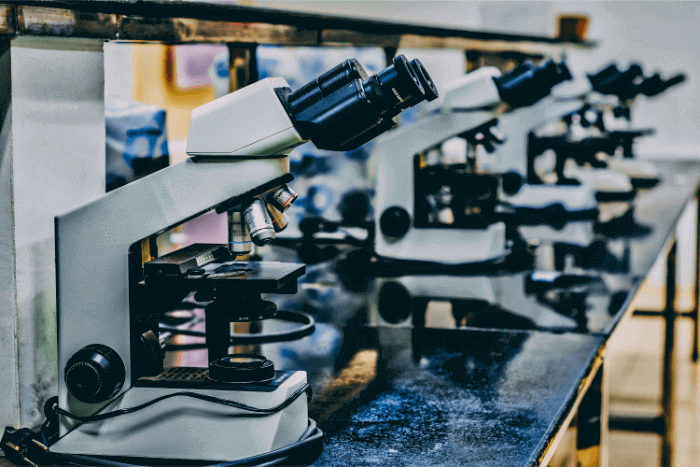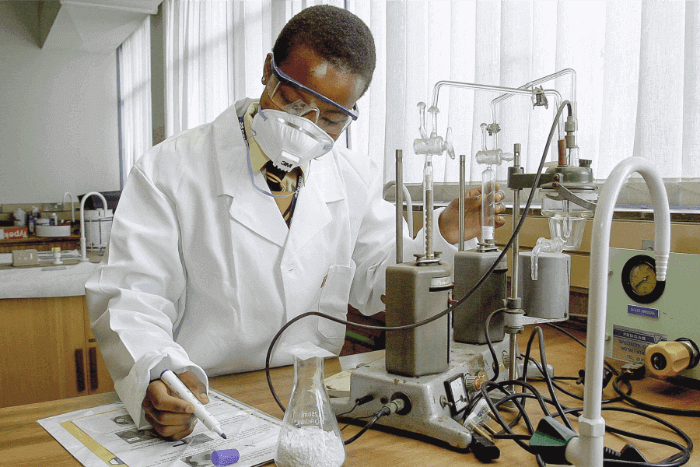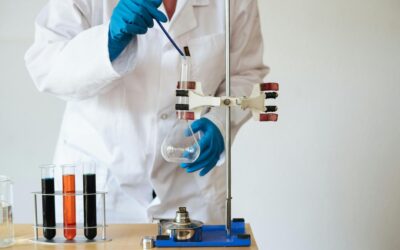What does it mean to study science at university?
Studying science at university is, in some ways, similar to how you might have studied science at school. You’ll learn through a mixture of theory and practice via lectures, tutorials and labs. But there are also some key differences, including the shift to the importance of cutting-edge research.
This is what makes studying science at university so exciting. You will be taught by people who are currently carrying out research in the topics you’re learning about, so they can really give you the most up to date knowledge in that area. You may even get the chance to contribute to this research during your time at university!
Science is about discovery. So while it’s important to learn what others have already done, degree-level science is all about what we don’t know yet know, and how we’re going to find it out.
Different types of science
If you know you want to study a science course at university, the first question to bear in mind is whether you’re looking for a broad degree title, such as Biological Sciences, Chemistry or Physics. Or perhaps you’re interests lie in something more specialist, such as Microbiology, Pharmacology or Astrophysics.
A broader degree will give you a brief insight into a huge variety of fields in your first year, and in most cases you can choose a specialisation in later years. This is a good option if you’re not completely sure about what you’re most interested in or what career path you want to take.
On the other hand, if you already have a clear idea of a particular area you enjoy most it’s better to go for a more specialist course. Then you can learn about that area in much more detail from the very beginning. For example, if you know you want to be a Marine Biologist, you may prefer not to have to sit through all the plant metabolism and genetics lectures of a first-year Biology course!
Choosing a more specialist degree, such as Marine Biology, also means you will be more qualified to go straight into a job in this field after graduating. If you do a broader degree like Biology, you’ll probably have to complete further postgraduate study before entering the world of work.

How long is a science degree? And do you get a Masters at the end?
Once you’ve decided on the subject area you’d like to study, you still have to narrow down the course you want to do. You also have to decide whether you want to do a three or four year course. The main options you have are:
- Standard Bachelor of Science (BSc) degree (three years)
- BSc degree with an additional year abroad or year in industry (four years)
- Master of Science (MSc) in which the first three years are usually the same as the BSc, but with an integrated Masters in your final year (four years)
There are advantages and disadvantages to each option so you should think carefully about which is right for you. A year in industry can be very helpful for getting experience, contacts and maybe even job offers in a particular field you may wish to work in after graduating.
On the other hand, if you like the idea of doing your own research, the integrated Master’s option would be a great choice. This means you don’t have to worry about applying for a separate Master’s course in your third year. And you also save money because your tuition fees will stay the same for all four years, whereas a separate Master’s would cost you much more! Some universities (such as the University of York and University of Leeds) will allow you to switch onto an MSc from a BSc during your course depending on how well you’re doing. So this is also something to bear in mind if you’re not sure which option you’d prefer right now.
Balance of lectures and labs
One thing you often hear science students talking about is the large number of ‘contact hours’. This is the number of hours a week you’re receiving direct teaching from the university. This can vary between different science subjects and in different years of your degree. But in first-year, you should expect to have lectures every day and labs at least twice a week.
In contrast, students on arts courses like History or English have far fewer contact hours and spend much more time on independent study. You should consider which kind of study experience would suit you. If you like a clear structure to your day or think you might struggle with having a lot of independent work, a science degree is probably a good choice for you!
Lectures are where you are taught most of the content you need to know. Usually, lectures last 50 minutes and you will be tested on their content your exams. Labs help you acquire the practical skills you’ll need if you want to pursue a career in research. Labs can be really fun but also tiring, especially if you have several in one week. This means you need to make sure you’re looking after yourself so you can get the most out of them – prioritising sleep is very important!
Science tutorials
At many universities, you’ll also have one or two tutorial or seminar sessions a week. These are in smaller groups of students with one tutor, or sometimes one-to-one with a professor. In these classes, you can go over material you didn’t understand in lectures, or go into more depth on something you find really interesting. Teaching of this nature exists to push you slightly further and challenge you more intensely. You’ll have a chance to ask all the questions you may not be confident enough to ask after lectures.
Your tutors will usually set an assignment for you to complete before the session, and you’ll go through the answers and exchange ideas with your peers.
Read more about reasons to be a scientific researcher.
What A-Levels or IB qualifications will you need?
The A-Level or IB qualifications you’ll need to study science at university vary depending on the course and the uni. So this is something you’ll need to keep checking for every new course you look at. In many cases, especially for Russell Group universities, they ask for at least two ‘Hard Science’ subjects at A-Level or Higher Level IB. When you see ‘Hard Sciences’, they mean Biology, Chemistry, Physics or Maths. Here are some examples of the requirements from different courses:
MSci Cell Biology at Manchester University:
A Levels: AAA-ABB, including two of Biology, Chemistry, Physics and Maths. However, if your grades are AAB or higher, they will accept Geography, Psychology, Environmental Science or PE in place of one of the Hard Sciences.
IB: 36-33 points overall with minimum 6, 5, 5 at Higher Level including two science subjects, preferably Biology and Chemistry.
MChem Chemistry at the University of Oxford:
A Levels: A*A*A, with both A*s in science subjects and/or Maths. A-Levels in both Chemistry and Maths are essential, and A Levels in another science or Further Maths are recommended.
IB: 40 points overall, with 7 in Higher Level Chemistry and either 6/7 in Higher Level Mathematics, or 7 in Standard Level Mathematics (Analysis & Approaches) plus a second 7 in a science at Higher Level
BSc Physics at the University of Leeds:
A Levels: AAB, including Physics and Mathematics, excluding A-Level General Studies and Critical Thinking.
IB: 35 points overall with 15 points at Higher Level, including 5 in Higher Level Physics and 5 in Higher Level Mathematics.
As you can see, the requirements will vary a lot and this is something you should be mindful of before choosing your course, and maybe your A-Level / IB subjects too!

Which are the best Universities to study science in the UK?
Again, the best universities to study science in the UK vary based on the course. The easiest way to compare different universities by course is to use one of the main league tables – these are provided by the Guardian, Times Higher Education and the Complete University Guide.
These tables rank different universities based on things like how the current students rate their course, the staff:student ratio, how important their research is globally, as well as how likely students are to get good jobs after they graduate. Universities that usually rank highly on these tables for science subjects include Cambridge, Oxford, Durham, Imperial College London, York, Bristol and Manchester.
However, just because league tables are the easiest way to compare different universities, does not mean they’re the best way! Different tables can vary a lot on where they place the same universities, and the indicators they use aren’t always accurate. This is why you should try to visit as many universities as possible on open days, speak to current students and tutors, and see the facilities for yourself before you make any decisions about where to apply.
Another way to check that a science course you’re considering is of a high standard is to look at whether it’s got a ‘professional accreditation’. This means a relevant professional body has approved the course for providing students with the skills they would need to have a career in a science industry after graduating. The bodies include the Royal Society of Biology (RSB), the Royal Society of Chemistry (RSC), the Biochemical Society, the Institute of Biomedical Science (IBMS), and the Institute of Physics (IOP). Having a degree that has been accredited can increase your employability so this is important to think about before you choose your course.
Next Steps for Future Science Students
- Investigate your options using the UCAS course search engine, to find the full variety of science courses offered in the UK.
- Learn about our Oxford summer school for high school students.




